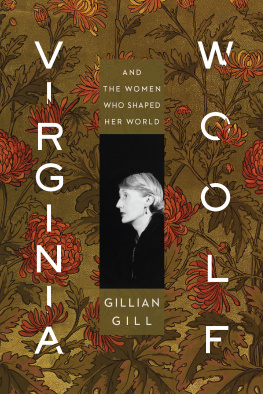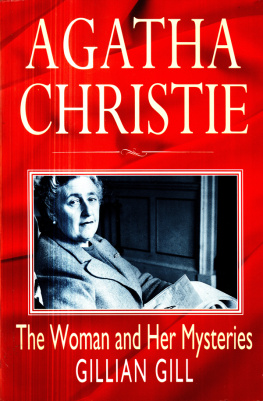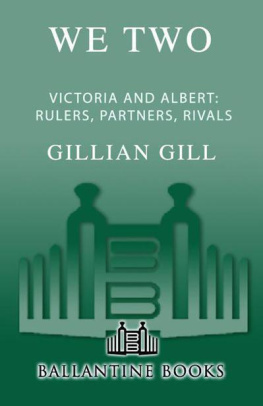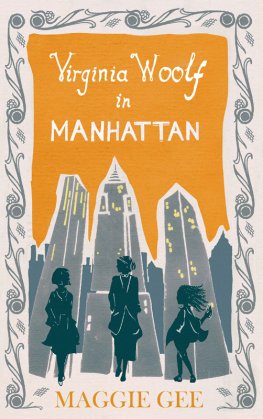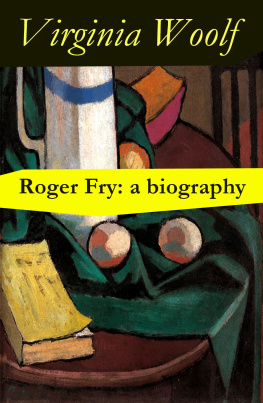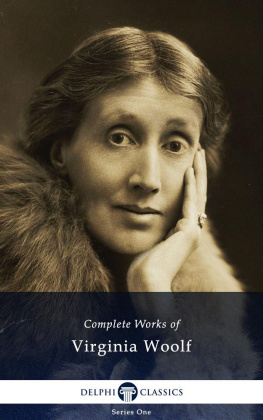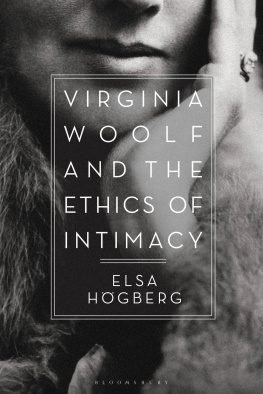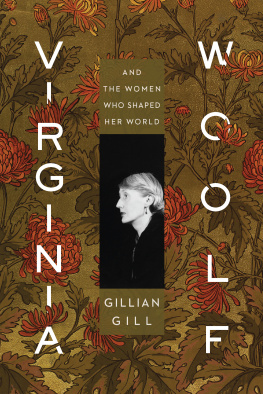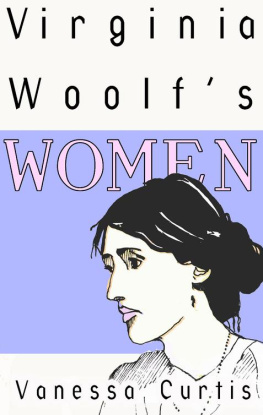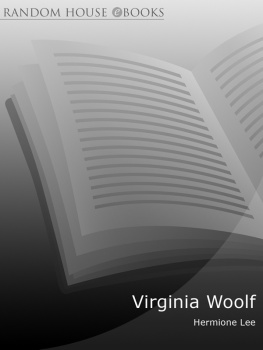Copyright 2019 by Gillian Gill
All rights reserved
For information about permission to reproduce selections from this book, write to or to Permissions, Houghton Mifflin Harcourt Publishing Company, 3 Park Avenue, 19th Floor, New York, New York 10016.
hmhbooks.com
Library of Congress Cataloging-in-Publication Data
Names: Gill, Gillian, author.
Title: Virginia Woolf : and the women who shaped her world / Gillian Gill.
Description: Boston : Houghton Mifflin Harcourt, 2019.
Identifiers: LCCN 2019012511 (print) | LCCN 2019019205 (ebook) | ISBN 9781328694485 (ebook) | ISBN 9781328683953 (hardcover)
Subjects: LCSH : Woolf, Virginia, 18821941Friends and associates. | Woolf, Virginia, 18821941Family.
Classification: LCC PR6045.O72 (ebook) | LCC PR6045.O72 Z6439 2019 (print) | DDC 823/.912 [ B ]dc23
LC record available at https://lccn.loc.gov/2019012511
Cover design by Martha Kennedy
Cover images: Portrait of Virginia Woolf by Man Ray, Man Ray 2015 Trust / ARS, NY / ADAGP, Paris/Art Resource, NY; wallpaper by Walter Crane / V&A Images, London / Art Resource, NY
Author photograph Gail Samuelson
v1.1019
The Diaries of Virginia Woolf edited by Anne Oliver Bell 1977 by Quentin Bell and Angelica Garnett; The Letters of Virginia Woolf edited by Nigel Nicolson and Joanne Trautman 1975 by Quentin Bell and Angelica Garnett; and Moments of Being by Virginia Woolf edited by Jeanne Schulkind 1976 by Quentin Bell and Angelica Garnett all reprinted by permission of The Society of Authors as the Literary Representative of the Estate of Virginia Woolf, The Random House Group Limited, and Houghton Mifflin Harcourt Publishing Company. All rights reserved. Sir Leslie Stephens Mausoleum Book. Text by the proprietors of the Leslie Stephen copyrights, 1977. Reproduced by permission of Oxford University Press through PLSclear. All rights reserved. The Letters of Lytton Strachey edited by Paul Levy. Letters copyright 2005 by The Strachey Trust. Reprinted by permission of The Society of Authors as Agents of The Strachey Trust. All rights reserved. Vanessa Bell by Frances Spalding. Copyright 1983 by Frances Spalding. Reproduced by permission of the author c/o Roger, Coleridge & White Ltd. All rights reserved. Beginning Again: An Autobiography of the Years 19111918 by Leonard Woolf. Published by The Hogarth Press. Copyright 1964. Reprinted by permission of The University of Sussex, The Society of Authors as the Literary Representative of the Estate of Leonard Woolf, and The Random House Group Limited. All rights reserved.
For Stuart
Women alone stir my imagination.
Virginia Woolf
Introduction
VIRGINIA WOOLF matters to us. She speaks to our lives, inspires our polemic, lodges in our collective memory, and shapes our prose. For an English man who lived, as Woolf did, before most of us in todays world were born, that would be no small trick. For an early-twentieth-century English woman it is perhaps unique.
Woolf had an original mind, lived at an important point in history, read everything she could put her hand on, and labored every day, well or ill, mad or sane, to write novels, meet her book review deadlines, scrawl a pile of letters, work up bits of dialogue and thumbnail sketches, and record in her diary the things her mind was busy with. You learn to forge by hammering, goes the old French saying, and as she scribbled and typed, Woolf was forging a style. Elegantly personal. Unpretentiously authoritative. Chattily erudite. Eminently readable. Today, the name Virginia Woolf is a meme, and she is even more read, more quoted, and more influential than she was in her lifetime.
A writer by profession, she published a great deal of what she wrote and kept even more. Her family had long had a sense of history and understood that what was not written down might almost not have existed. The Stephens and Pattles, among Woolfs paternal and maternal ancestors, understood the value of old pieces of paper covered in handwriting. By keeping letters and diaries, they knew they stood a chance of becoming part of English social history.
In todays America you can become famous just by working hard at being famous, and girls and women can compete in the new fame game with boys and men, but this is all very new. Before the twentieth century, the handful of women whose names entered the historical record were empresses, queens, or aristocratsCatherine the Great, Elizabeth I, Sarah, Duchess of Marlboroughor else the wives, mothers, sisters, daughters, and mistresses of famous men. We know about Miltons daughter and Stalins, the mistresses of Horatio Nelson and Charles Dickens, Wordsworths sister and Freuds sister-in-law, Marcel Prousts mother, and the wives of James Joyce or D. H. Lawrence or Vladimir Nabokov or Winston Churchill orwell, the list goes on. Adeline Virginia Stephen Woolf, in contrast, was solidly middle-class; and her father, Leslie Stephen, and her husband, Leonard Woolf, both much published writers in their day, are now read because they were related to her.
Being born in the England of Queen Victoria was a key to Woolfs success as a writer. By 1882, the year of Woolfs birth, England had produced more professional women writersnovelists, poets, essayists, travel writers, biographers, and journaliststhan any other country, and in the nineteenth century there was an explosion of female literary talent in the United Kingdom. Jane Austen, Charlotte Bront, and George Eliot are now high on our list of top English writers of all time, and many of us would argue fiercely that Mary Wollstonecraft, Mary Shelley, Elizabeth Gaskell, Elizabeth Barrett Browning, Emily Bront, Anne Bront, Christina RossettiI could go onshould be on everyones must-read list.
Rare in her generation, Virginia Woolf valued the contribution of women to the English literary tradition as much as we do today. From childhood she immersed herself in the work of women writers of the past, and as a prolific reviewer and essayist she liked to choose books that allowed womens voices to be heard. She saw herself as a link in a chain of women writers, and this pride in tradition was a spur to her authorial ambitions. At the same time, she knew better than most the enormous obstacles that even the greatest women writers of the past had faced, and saw with clear eyes the sadness, often amounting to tragedy, of their lives.
England from the late eighteenth century on was one of the very few countries (the young United States was another) that chose to teach a good percentage of its daughters to read and write. Among English speakers, a market quickly grew up for poetry, fiction, and journalism that would appeal to the female reader. Seeing that market, educated women of small means turned their hands to writing, less in the hope of eternal fame than of respectable independence and support for their families, and they were in a race against time to do it. In our American world today, women can expect to live into their eighties, but Victorian women tended to die young.
Isabella Beeton, who compiled the famous cookbook published under her name, was not atypical, dying in childbirth at the age of twenty-nine, a victim of puerperal fever complicated by the syphilis she had contracted from her husband. The three (surviving!) Bront sisters, Charlotte, Emily, and Anne, had genius on their side, but they were no luckier than poor Isabella Beeton. In between peeling endless potatoes at home and struggling with rich peoples recalcitrant children away, they wrote novels and sent them under male pseudonyms to a London publisher, betting, astutely, that they could make a better life for their family as novelists than as governesses. The galloping consumption that was epidemic in England carried off Anne and Emily before they turned thirty, but Charlotte at least lived long enough to write her masterpieces, earn a modest affluence for her father and husband, and get a tiny taste of what it might be like to be a literary lion like William Makepeace Thackeray or Charles Dickens. All the same, even as Great Britain was birthing an unprecedented number of Great Women Writers, nineteenth-century English society as a whole still agreed with the librettist W. S. Gilbert that, if a beneficent autocrat were to rid society of that singular anomaly, the lady novelist, she never would be missed.

